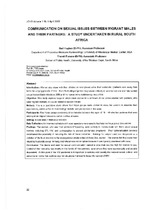Communication on sexual issues between migrant males and their partners: a study undertaken in rural South Africa
Abstract
INTRODUCTION: Women stay alone with their children in rural places while their husbands I partners work away from
home for varying periods of time. Such fluctuating migration may cause difficulty in communications and may spread
sexual transmittable infections (STI) and the human immunodeficiency virus (HIV).
OBJECTIVE: This study explored ways in which black women in rural South Africa communicated with partners, who
were migrant workers, on issues related to sexual matters.
Method: This is a qualitative study where four focus groups were utilized to allow the women to describe their
experiences, and to verbalize their feelings, beliefs, and perceptions in this area.
PARTICIPANTS: Four focus groups consisting of six females between the ages of 16 - 48 who had partners that were
employed as migrant labourers and do not live at home.
Setting: A rural area in Hlabisa jurisdiction.
DATA COLLECTION: An interview schedule with open questions were used to facilitate the focus group discussions
Findings: The women, who saw their partners infrequently, were unlikely to communicate with them about sexual
matters, including STI, HIV, and contraception to prevent unintended pregnancy. Poor communication severely
constrained the possibility of reducing the risk of these outcomes. Raising the subject could be interpreted as a
violation of the trust attached to the monogamous relationships of these Zulu women. The women felt they owed their
returning husbands sexual intimacy and refusal was not an option because it was typically countered with force.
CONCLUSION: The desire and need for sexual communication carried a price that was too high for women to pay.
Control of their sexuality was mostly in the hands of their partners, upon whom they were economically and socially
dependent. At this point in the HIV pandemic is it important to cultivate and identify the relevant social, cultural and
behavioural norms that could reduce risk situations that tend to favour the spread of HIV.

